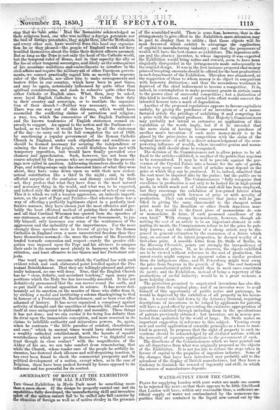ASCENDANCY OF MONEY AT THE EXHIBITION FOR ALL NATIONS. Tan
Great Exhibition in Hyde Park must be something more than a mere -show. If the design be properly carried out and its eapabilities fully developed, the -manufacturing skill and inventive pint of the nation carnet fail to be called into full exercise by the stiniulns of foreign as well as of native rivalry in the presence , of the assembled world. There is some fear, however, that in the arrangements to give effect to the Exhibition more attention may be paid to display than to 'utility.; that those objects will be most favoured which exhibit to 'advantage the application of capitalle manufacturing industry ; and that the possessors of wealth will have the best chance as exhibitors. The ingenious arti- san and the obscui e inventor, to whose ingenuitylt was expected the Exhibition would bring notice and reward, seem to have been singularly disregarded in the arrangements made subsequently to the original design. It was in the first instance proposed that money prizes of tempting amounts should be offered-for the best productions in each department of the Exhibition. This plan was abandoned, at the suggestion of those to Whom money is no object in comparison with honorary distinction ; and thus the necessitous workman is deprived of the chief inducement to become a rcompetitor. It is, indeed, in contemplation to make pecenisry grants in certain eases
to the poorer class of successful competitors ; • but a distinction of this kinds invidious, and if carried into effect would convert the intended honour into a mark of degradation.
Another of the proposed regulations appears to favoureapitalists unduly, by giving the purchaser of an invention or of as manu- factured article the privilege of exhibiting it and competing for a prize with the original producer. Her Majesty's Commissioners may probably not intend so extensive an application of this regulation as the words imply, but if it be -intended that the mere claim 'of having become possessed by purohase of another man's invention—if such mere money merit is to be
platted by the prize-juries in competition with the claim of the original inventor—it will be a direct acknowledgment of the over- owering influence of wealth, where inventive genius and manu- facturing skill should alone be recognized.
The decision of the Commissioners not to allow prices to be af- fixed to the articles exhibited, is another of thepointsthat requires to -be reconsidered. It may be well 'to provide against the per-
version of the Crystal Palace into a 'bazaar for the sale 'of goods, but in very many cases the merit of artieles anust,depend on the price at which they can be produced. It is, indeed, admitted that
the cost must be inquired into hy the juries ; but the public are to be kept in the dank. 'The Commissioners "fully recognize that excellence in production is not only to be looked for in high-priced goods, in which• much cost of labour and skill has been employed, but they encourage the exhibition of low-prieed fabrics when combining quality with lowness of price or with novelty of production. They can readily conceive that juries will be jus- tified 'in giving the same elassanedal to the cheapest calico
print made for the _Brazilian ,or other South American ,mar-
ket, as they would to the finest piece of mousselaine de soie or mousselaine de Line if each possessed excellence of its own kind." With strange inconsistency, however, though ad- mitting the cost of an article to be an important 'element in esti- mating its merit, the Commissioners refuse to let the:price be pub- licly known ; and the exhibitor of a cheep article may be dis- graced in general estimation by the coarseness of a fabric which may, on account of its latent properties, -be deemed worthy of a
first-class prize. A sensible letter from Dr. Stolle of Berlin, in
the Morning Chronicle, points out strongly the inexpediency of the exclusion of prices. If, as he observes, the objects exhibited are to be viewed without reference to the cost of production, the rarest exotic might surpass in apparent value a similar product from its indigenous clime, end St. Petersburg might bear away the prize from Smyrna in the,growth of figs. The cost bestowed upon a manufactured article would thus in most cases constitute its merit; and the Exhibition, instead of being a repertory of the -productions of useful industry, would be in a great measure a mere holyday show. Theprotection promised to nu-patented inventions has also dis- appeared from the original plan; and if an inventor were to avail himself of this opportunity of public notice and patronage, he would be deprived by the exhibition of all property an his inven- tion. A recent rule laid down by the Attorney-General, requiring
descriptions of inventions to be lodged by applicants for .patents,
will have a good effect by preventing the exclusive appropriation of inventions exhibited through including them in the specifications of patents previously obtained : but inventors are in nowise pro- tected from spoliation by the world at large. Dr. 'Stolle makes an important suggestion in reference to this subject. Viewing every new and useful application of scientific principles as a boon to man- kind in general, he proposes that the right of property to such in- ventions should be acknowledged by all civilized nations, without the necessity of separate applications to the government of each.
The directions of the Commissioners which we have pointed out are -all 'departures from what was originally proposed as the objects of the Exhibition. It is not too late to retrace the steps taken in favour of capital to the prejudice of ingenious industry. Some of the changes that have been introduced may probably add to the splendour of the display of British manufactures, but they have -a tendency to diminish the reward of ingenuity and skill, on which the success of manufactures depends.


























 Previous page
Previous page